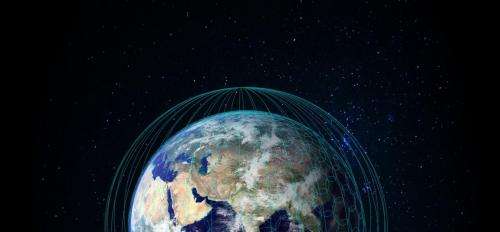January 18, 2015 weblog
OneWeb satellite constellation plan wants Internet for billions

OneWeb has announced a satellite constellation concept to make high-speed Internet and telephony available to billions of people lacking access. OneWeb plans to launch a network of satellites to deliver such access affordably, across the world. The Virgin Group and Qualcomm are initial investors for what Richard Branson said will be the world's largest-ever satellite network.
This will be a low-earth-orbit satellite constellation; the news release from OneWeb referred to the satellites as "telecom-class micro satellites." In addition to having invested in OneWeb, Virgin will also be the satellite launch provider for the project via its Virgin Galactic arm. To get them there, the idea is for Virgin Galactic's LauncherOne program to enable frequent satellite launches. In an interview with CNBC.'s "Squawk Box," Branson, the founder of Virgin Group, said the plan was fantastic for Virgin Galactic because LauncherOne was "a very efficient way of putting satellites into space and much more efficient than the big rockets of the past, in that we can literally take off every three or four hours, replenish satellites as and when they come out..take off again and put more up." Branson also told the CNBC that "We plan to put an initial array of 648 satellites up, and if that's successful, we want to go to 2,400 satellites."
How it would work: This fleet of micro satellites would provide low-latency, high-speed Internet access directly to small user terminals deployed around the world. Under this system, the networks of mobile operators globally would provide coverage to rural and remote areas which historically have not been "economically feasible to connect using terrestrial networks," said OneWeb, .which would work with local operator partners to provide this access. OneWeb terminals act as small cells with the ability to provide access to the surrounding area via a WiFi, LTE, 3G or 2G connection using an operator partner's licensed spectrum, or only LTE or WiFi on unlicensed spectrum. In addition to providing coverage for phones, computers or tablets, OneWeb's network would also step up for e emergency and first-responder access for disaster situations, refugee camps or other areas.
Branson talked about costs in the MNBC interview. "As far as price is concerned, the initial array is going to cost nearly $2 billion to do but we can still be very competitive on price as far as the end user is concerned."
In a Virgin posting on Thursday, Branson said, "Delighted to share news of an incredibly exciting project that could transform the world." According to the International Telecommunications Union, as of the end of 2014, more than half the world's population lacked Internet access. "People who don't currently have access to proper teaching will be able to receive educations. People who want to create jobs will be able to develop new businesses connecting with the rest of the world. The opportunities are endless," said Branson. He told CNBC the idea was to reach and provide access to these people and to do so "with good-quality reception at good prices."
More information: www.businesswire.com/news/home … n-Bring#.VLq0oEdd0vP
© 2015 Tech Xplore
















